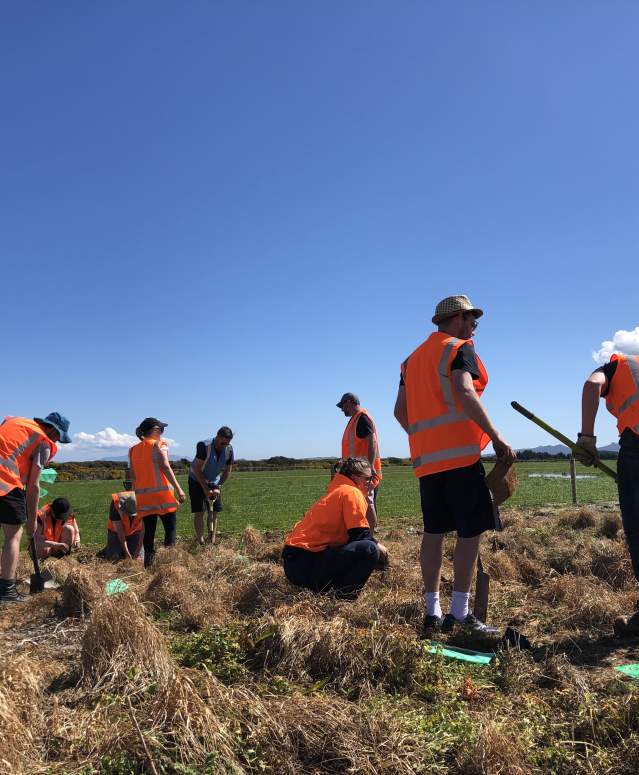Sustainability
Incorporating sustainable practices into your event plan can reduce the environmental impact of your event, contribute to a positive reputation, and create a memorable experience for attendees.
Event organisers have both a responsibility and a great opportunity to promote sustainable practices through the design and planning of their events – from waste management and recycling to sourcing low-emission venues to minimising carbon output and more. Providing attendees with the means to participate in and contribute to these practices can heighten positive feelings of connectedness and ‘working together for the greater good’ that many people associate with events. Taking sustainable practices one step further into the realm of a regenerative approach to event planning supports this even further.
There are many traditionally wasteful aspects of event planning that can be replaced with sustainable or regenerative alternatives. A willingness to change the learned habits that define the ‘business as usual’ approach to event organisation can lead to innovative and exciting developments.
Tips:
Creating Sustainable Events
- Conduct a sustainability audit to identify areas for immediate improvement. These could include:
- Removing all single-use plastics
- Prioritising local suppliers
- Switching to locally sourced food
- Determine your event sustainability goals and targets.
- What are you trying to achieve?
- How are you going to achieve your goals?
- How are you tracking or collecting data to highlight progress?
- Develop a sustainability strategy. Consider strategies for:
- Removing all single-use plastics
- Waste management and recycling
- Transportation – encourage public transport or ride-share
- Locally sourced food and food waste minimisation
- Prizes and giveaways – eco-friendly options
- Digital event information – event app or website
- Seek advice from industry experts and utilise the tools and resources available to guide your planning and implementation.
- Include stakeholders (sponsors, attendees, community etc) in your sustainability journey. Ensure regular engagement and education around goals, objectives, and ideas.
- Share your achievements and impacts to influence others and gain feedback on the improvements you’ve made to your sustainable event.
Responsible Decision Making
Your event planning decisions define the experience and ‘feel’ of your event, which flow on to public perception and reputation.
- Prioritise local and low emission venues, suppliers and vendors that engage in responsible and sustainable practices. This can be a multi-faceted positive decision with many benefits such as:
- Reducing environmental impact
- Supporting your local economy
- Bolstering your event’s public perception
- Utilise locally produced, recycled and/or reusable event supplies where possible.
- Encourage sustainable behaviours to create a positive impact and legacy for your local community, sponsors, and attendees.
Partnerships and Community Engagement
- Include attendees in your event’s sustainable and regenerative initiatives where possible and offer education on how to implement similar initiatives at home.
- Partner with local businesses, organisations, and charities to achieve your event’s sustainability goals.
- Engage with your local community by offering community groups opportunities to fundraise through your event. For example: utilise their members to collect and sort event waste (supports both sustainable practices and community engagement).
Sustainable vs Regenerative Practices
The term sustainability can be defined as ‘the ability to be maintained at a certain rate or level.’ It has become more common to go past this ‘maintenance’ approach to envisage pathways in which regeneration is the goal, over and above what currently exists.
- Consider ways that your event can effect positive change to the environment and your community.
- Donate a percentage of proceeds from your event to local regenerative projects as a simple way to start implementing regenerative practices alongside your sustainability efforts. This could also include a voluntary donation collection from attendees at your event.
- Examples of regenerative projects to consider donating to include:
- Native tree plantings
- Wetland and waterway restoration
- Biodiversity and pest control projects
- Regenerative agriculture initiatives
- Community-based educational programmes
- Consider ways that your event could achieve regenerative outcomes directly, as outsourcing to existing projects is not the only way to go about this. Work to your strengths and those of your partnered organisations.
Venue
Selecting the right venue sets the context for any event, particularly when considering principles of sustainability and regeneration. Considerations when selecting a venue include:
- Easy access by public or shared transport.
- Low-emissions – the venue heating isn't reliant on burning fossil fuels like coal or diesel; instead, it utilises sources like electricity or wood pellets. The significance of this aspect cannot be overstated in terms of reducing the carbon footprint of an event, as heating is a major source of pollution.
- If you are finding it difficult to locate a local low-emissions venue, let existing venue operators know that this is a priority for you and your community – change often requires prompting!
Transportation
- Consider the environmental impact of freight and transport options for your operations.
- Promote sustainable transportation options for attendees such as walking, cycling, or public transportation. To encourage uptake of these options, you could:
- Provide secure bike racks at the venue.
- Create a fun competition or incentive to support these initiatives.
- If your venue location requires travel, consider providing a free or low-cost shuttle service from central points to the event or encourage attendees to carpool / rideshare.
Waste Minimisation
- Avoid single-use items or opt for reusable or compostable alternatives for cutlery, plates, containers, and cups.
- Provide water stations for attendees where they can refill their own bottles.
- Reduce food waste through accurate guest count estimation, coordinating with caterers to donate surplus food to local charities, and composting both organic food waste and compostable packaging.
- Provide event information digitally e.g. pre and post-event communication sent via email; create event app and/or event website; provide event updates via Social Media platform(s).
- Sort event waste accurately and recycle or reuse where possible.
- Recycle or upcycle resources for event theming, signage, name badges/lanyards etc where possible.
- Provide reusable eco-friendly bags or containers for giveaways.
- Refer to our [Waste Management section] for waste minimisation and management advice.
Carbon Offsetting
A carbon footprint is a measure of greenhouse gas emissions – there are 7 main greenhouse gases, which are usually converted to their equivalent in carbon dioxide for easier comparison.
- Offset the event's carbon footprint by investing in carbon offset projects or supporting local environmental initiatives.
- It is more efficient to minimise carbon output than to offset it, therefore look at where you can reduce this across your event’s activities. E.g. go digital, recycling.
Social Sustainability
Consider ways that your event could contribute to:
- Community values and structure
- Equitable and empowering educational and employment opportunities
- Social stability (peace and justice)
- Physical health and wellbeing
- Mental health and wellbeing
- Celebration and tolerance of diversity
- Productive local food networks
- Access to potable water
- Access to healthy and sustainable housing
- A healthy lived environment
Cultural Sustainability
Honouring, respecting, and celebrating the diverse cultural landscape of our society contributes to a more cohesive and collaborative lived experience for all.
- Engage with local rūnanga and iwi where appropriate to ensure Te Ao Māori values, traditions and customary practices are provided for and adhered to in your activities.
- Te Ao Māori values include:
- Whanaungatanga (a sense of belonging)
- Manaakitanga (altruism)
- Kotahitanga (oneness, unity)
- Rangatiratanga (self-governance)
- Mōhiotanga (sharing of knowledge)
- Māramatanga (understanding)
- Kaitiakitanga (guarding our taonga)
- Whakapapa (genealogy)
- Consider whether your event aligns with the Tiaki Promise – a statement of intent regarding respect, protection, and care for Aotearoa New Zealand.
Economic Sustainability
- Make informed and appropriate financial decisions to ensure your event’s ongoing sustainability.
- Provide sustainable pay rates (i.e. a living wage) to ensure that your staff and contractors can sustain themselves and their families.
- Innovation and technology can be used to drive profitability in a sustainable manner.
- Maintain a code of ethics around profit, people and the environment to ensure no one is short-changed by your event’s activities.
- Utilise local suppliers, vendors, staff, venues, community partnerships and services to strengthen your local economy.
Useful Links:
Seven ways to make your event more sustainable – Sustainable Business Network NZ
Recycle.co.nz | Reclaim - New Zealand
Sustainability Checklist (waikatonz.com)
The little things that all add up | Content Hub | Cardrona NZ
Remarkables Market: a journey to becoming NZ's first zero waste market | Queenstown NZ
Sustainable Supplier Checklist (sustainable.org.nz)
Creating Sustainable Events: 5 Steps for Success (www.cvent.com)
How can live events promote social responsibility (linkedin.com)
10 green event ideas can make huge difference (www.cvent.com)
Climate Action Toolbox (business.govt.nz/climate)
Have you considered?
- Which local community groups could you partner with in working towards sustainable outcomes for your event?
- Which event assets (signage, crowd barriers etc.) could you reuse or repair?
- How could your event reduce the waste produced by its activities?
- Do your event activities contribute to social or cultural sustainability?
- How can you involve your attendees in your sustainable and regenerative practices?
- How can your event take direct action towards environmental regeneration?
- Are your event finances sustainable?

